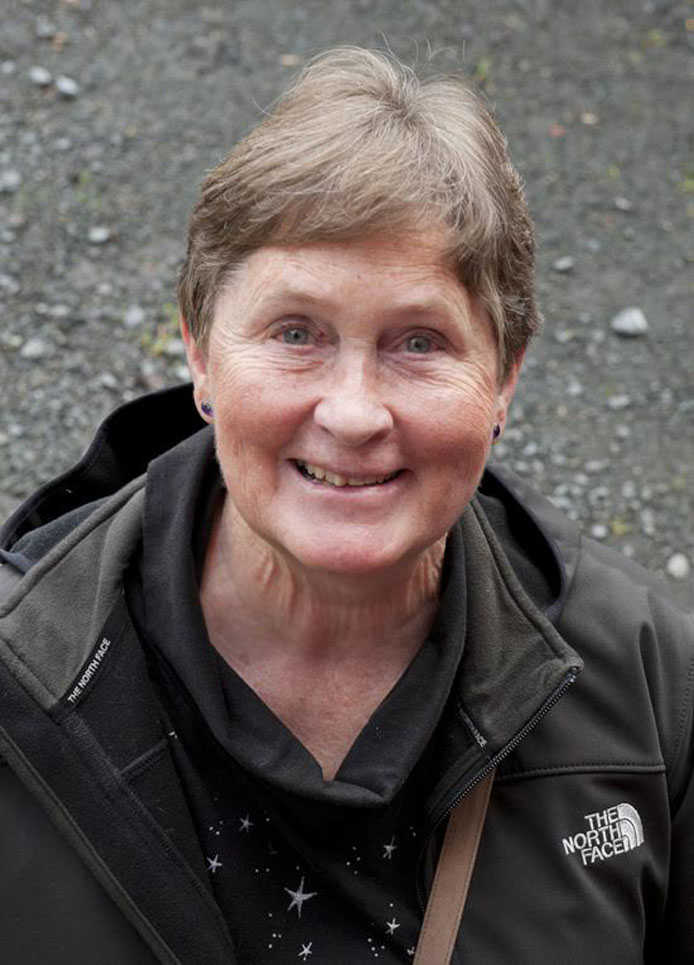SITKA — Two years ago, it was easy to tell who would win the race for House District 35.
On Alaska Day, the Republican challenger, Steven Samuelson, marched in the town’s annual parade down Sitka’s Lincoln Street with a few sign-carrying supporters.
The Democratic incumbent, Jonathan Kreiss-Tomkins, strode with a phalanx of supporters and a street-width banner. He shook hands and danced to the music played by the following Sitka High School band, where each musician carried a balloon bearing his name.
Kreiss-Tomkins won the election, 59 percent to 41 percent.
This year, as the Alaska Democratic Party seeks to construct a bipartisan majority in the Alaska House, Kreiss-Tomkins faces a tougher challenge to re-election.
His challenger this time is Sheila Finkenbinder, a Sitka resident of 26 years and former head of the Sitka Chamber of Commerce.
On Alaska Day this year, Finkenbinder marched in the parade with U.S. Sen. Lisa Murkowski and a contingent of sign-waving supporters. Kreiss-Tomkins’ group, farther back in the parade, was a bit smaller and a bit quieter than it was two years ago.
Before the parade, Finkenbinder stopped to talk about her run for office and her chances of beating the incumbent.
“It’s going to be close,” she said.
House District 35 covers about half of southern Southeast, encompassing all of the City and Borough of Sitka, Prince of Wales Island and Petersburg, as well as Angoon, Hoonah and Kake.
Forty-nine percent of the district’s registered voters live in Sitka. About 20 percent live in Petersburg, and the rest are scattered throughout its many small towns.
“I think there’s sort of 20 different campaigns. There’s one campaign in each of the different communities of the district,” Kreiss-Tomkins said.
If Sitka is divided on the merits of the two candidates, he’s betting on the district’s other 51 percent to send him back to the Legislature in January.
On Wednesday morning, he was en route to Petersburg for several days of campaigning. Finkenbinder was doing the same.
While Finkenbinder is running as a Republican and Kreiss-Tomkins as a Democrat, their race conspicuously lacks the partisan rancor president in the Trump-Clinton presidential race or even the lighter version present in the race between Cathy Muñoz and Justin Parish in Juneau’s Mendenhall Valley.
“I’m staying totally away from it. I just don’t bring it up,” Finkenbinder said of the presidential race. “Jonathan and I are not picking back and forth at each other on personal issues.”
“I think it’s been thoughtful and fair and on the issues so far, which is how I’d like to think politics in Alaska or politics in general should operate,” Kreiss-Tomkins said.
Kreiss-Tomkins conspicuously omits party labels from his campaign signs and posters, saying that in most of Alaska’s coastal communities, residents tend to vote for a name, not a party. Statistics from the Alaska Division of Elections show, however, that residents in the district tend to favor Democratic candidates for president.
In her local race, Finkenbinder’s core message is that Kreiss-Tomkins is inexperienced and ineffective in the Legislature.
“I’m running to get us stronger representation and greater influence in the Legislature for Southeast,” she said.
Kreiss-Tomkins responds that he’s been able to put Southeast interests forward in the negotiations to fund government each year. The annual vote to use the Constitutional Budget Reserve requires Democratic support, and as the price of his vote, Kreiss-Tomkins has rolled back some cuts to public radio, the Alaska Marine Highway System and other programs.
In the two candidate debates held thus far in Sitka (one is planned for Petersburg as well), Kreiss-Tomkins has continued his support for Gov. Bill Walker’s comprehensive fiscal plan to balance the state budget.
In Monday night’s debate hosted by Sitka High School, Finkenbinder said she does not support tax increases to balance the budget.
“Raising taxes is not something that I will be bringing forth,” she said.
In response to another question, she said she wants to see balanced budgets through economic growth. “Economic growth happens through individuals,” she said. “The best thing the government can do is get out of the way.”
On Nov. 8, Southeast Alaska voters will decide.

